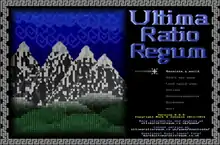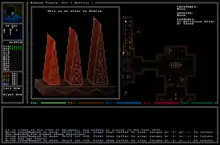Ultima Ratio Regum (video game)
Ultima Ratio Regum (Latin for 'the last argument of kings') is a roguelike created by Mark R Johnson. It was started in 2011 and was intended to be a ten-year project,[1] and has returned to active development since December 2020 after several years without a release.[2] The game takes place in a procedurally generated world around the time of the scientific revolution.[1] It is about "uncovering an intellectual conspiracy to rewrite history in the most culturally, religiously and socially detailed procedural world ever generated",[3] and the game's core technical objective is "nothing short of the procedural generation of culture".[4]
| Ultima Ratio Regum | |
|---|---|
 Title screen of Ultima Ratio Regum | |
| Designer(s) | Mark R Johnson |
| Platform(s) | Microsoft Windows |
| Release | 9 July 2012 |
| Genre(s) | Roguelike, strategy |
| Mode(s) | Single-player |
Gameplay

Ultima Ratio Regum is presented in a roguelike manner with ANSI characters and features permadeath. Unlike most roguelikes, Johnson has stated that combat itself will not be the main source of difficulty, and the game is instead focused around a kind of cultural detective-work[5] wherein the player pieces together clues from the world's generated culture, history, religions, social norms, etc.,[6][7] to "uncover an intellectual conspiracy to rewrite history".[1] The whole world is procedurally generated, from solar systems[8][9] (the macro scale) to small details like tombstone engravings which are displayed with generated ANSI graphics (the micro scale).[8][10] Puzzles are also generated anew each game and scattered around the world,[11] to ensure that they are "not so easily spoiled by a wiki".[8] The game does extensive procedural generation of aesthetics and graphics, ranging from tables and chairs to ornate vases and religious altars.[12]
Civilizations have different policies that affect the player to varying degrees. NPCs have their faces generated in ANSI according to their civilization's genetic features and social norms (earrings, tattoos), and can be viewed ingame so the player may figure out the social class or origin of an NPC. There is no consistent cultural style, so in one game tattoos might be worn by people in lower-class districts, while in another one they might be a distinct feature of the ruling class.[3][13]
Development
Developer
Mark R Johnson is currently a Lecturer in game studies at the University of Sydney. After his undergraduate degree in politics and sociology, he studied for a PhD in science and technology studies from 2011 to 2014. He is also an ex-professional poker player.[14]
Influence
According to Johnson, Jorge Luis Borges, who "wrote a lot about themes which resonate with roguelikes but haven't been fully explored", Umberto Eco and Neal Stephenson were all inspirations for Ultima Ratio Regum.[3][8][14]
References
- "About Ultima Ratio Regum". ultimaratioregum.co.uk. Retrieved 9 April 2015.
- "2018 Year in Review | Dr Mark R Johnson". January 2019. Retrieved 31 January 2019.
- ""Massive Environmental Storytelling": An Interview with Mark Johnson". videogametourism.at. 8 May 2015. Retrieved 10 May 2015.
- "Norwich Gaming Festival 2015". ready-up.net. Archived from the original on 27 September 2015. Retrieved 9 June 2015.
- "Ultima Ratio Regum (v 0.6 released, 13th December!)". Temple of the Roguelike. 13 December 2014. Retrieved 17 April 2015.
- "Why Proc Gen Poetry Matters in Dwarf Fortress". Rock, Paper, Shotgun. 19 March 2015. Retrieved 17 April 2015.
- "Roguelike Radio: Ultima Ratio Regum". Roguelike Radio. 18 January 2015. Retrieved 9 April 2015.
- "Interview: Ultima Ratio Regum, A Generated 4X Roguelike". Rock, Paper, Shotgun. 18 October 2013. Retrieved 9 April 2015.
- "ProcJam Talks Schedule". procjam.com. 3 November 2014. Retrieved 17 April 2015.
- "ProcJam and the Future of Procedural Generation". PC Gamer. 9 February 2015. Retrieved 17 April 2015.
- ""Ultima Ratio Regum": Wie das Spiel eines 25-Jährigen komplette Welten simuliert". derstandard.at (in German). 10 May 2015. Retrieved 10 May 2015.
- "Norwich Gaming Festival Industry Days". norwichgamingfestival.com. Retrieved 17 April 2015.
- "The world is a found object, and we are imperfect archeologists". james-patton.net. 29 May 2015. Retrieved 1 August 2015.
- "About Mark Johnson". ultimaratioregum.co.uk. Retrieved 9 April 2015.